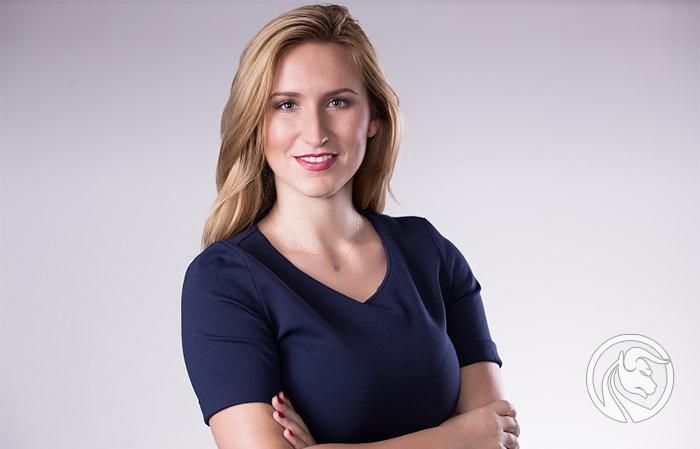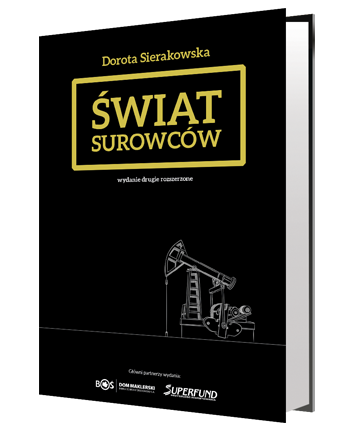"You have to trust yourself" - interview with Dorota Sierakowska about the work of an analyst, raw materials market and investing
Who is he Dorothy Sierakowska? Currently he is a raw materials market analyst at DM BOŚ. In 2017 she won the Analyst of the Year statuette at the gala Invest Cuffs. Editor-in-chief and publisher of the magazine "Trend", published a book "World of raw materials", which does not leave the podium of bestsellers in financial literature.
Who is an analyst really? What does his work look like? Why are commodity markets still treated rather niche and what are the prospects for their development? You will learn this and many other valuable tips on a career in finance and investing in the following interview.
I would like to thank Mrs. Dorota for her time. By reading an interview full of positive energy with Dorota Sierakowska, you'll find that her work is a demanding and time-consuming task, hence my tribute to my attention. We strongly encourage you to read.
You started your adventure with investing already in college. Where did you find your passion for raw materials markets?
I have always been interested in the subject of business and entrepreneurship, as well as knowledge about the possibilities of earning and multiplying money. During my studies I had the opportunity not only to broaden my knowledge, but also to meet a few interesting and inspiring people who infected me with passion for investing.
As a student, I was active in the SKN research club "Investor's Club" at the Warsaw School of Economics. It was during my studies that I set up an investment magazine with several friends "Trend", which in later years went far beyond the walls of the university. We touched on topics related to the stock, currency, real estate, etc. markets. My specialization quickly became writing articles primarily on investing in raw materials, a topic that was not often discussed in Polish media at the time.
In the raw materials I felt that it is a market that is close to us (refueling the car, cotton clothes, morning cup of coffee, etc.), and at the same time it is a market of huge money and large political influence. By gaining knowledge about commodity markets, we really learn a lot about the reality that surrounds us.
Could you tell what your day at work looks like? How do you prepare for your daily duties?
I'm lucky: I'm one of those people who do what they really like. I have always read a lot and loved to write, and the work of an analyst largely consists in constant learning and presenting my conclusions. In short: you need to acquire knowledge, review available information and data, break them down into prime factors - or on the contrary, synthesize them and separate grains from chaff - and finally explain these phenomena to recipients in a simple language in an understandable way.
Of course, different analytical positions require different organization of work, but in my case a lot of work involves reaching out to sources of knowledge (primarily foreign reports and studies), writing comments and reports, and media presence, i.e. creating press articles and appearing at conferences on television or radio.
A characteristic feature of my analytical work is the lack of regular working hours. Commodity markets operate around the clock, excluding weekends, so it's worth following the developments. Although I like to work in the morning the most, sometimes you have to appear on the recording late in the evening, but during the day you have time for a longer dinner or some sport.
Do you invest on your own? What approach (analysis) do you come from?
Yes, I started investing on my own account at the beginning of my studies and I have been doing it so far. And rather, I will have it for my whole life.
I invest in equity, currency and of course commodity markets. Due to my specialization, I allow myself to experiment with various types of financial instruments - sometimes I also test less liquid ones. I also have a relatively large share of goods in the portfolio, but this is due to the fact that I follow this market on a daily basis and decided that I could afford the increased risk associated with it.
Of course, I saw the hard way that emotional maturity in investing and some skills come with experience. Sometimes associating analogous facts with past or observing a price formation similar to previous ones allows you to almost intuitively decide to enter or leave the position.
By reading your book "The World of Raw Materials" you have presented (in my opinion) a very broad perspective on the raw materials market. It contains a really solid dose of information aimed at beginners and more experienced investors. What factor prompted you to write it? Is investing in commodity markets for everyone or for enthusiasts?
After several years of writing raw material analysis, I had an internal need to write a book about investing in raw materials. At the same time, I knew that such a book is needed on the Polish market, because investors in our country did not previously have any Polish source of complicated knowledge about the foundations of commodity markets and available financial instruments. So I quickly decided to start working on the book. For several months, every day until late evening, I created subsequent chapters. From the very beginning, I had an initial vision of the book in my head, while of course it evolved.
Writing the book turned out to be arduous, but very rewarding work. I was glad that "World of raw materials" met with positive feedback from many investors, and shortly after its release it landed on the financial bestseller list and - importantly - remains on it today!
Is investing in commodity markets for everyone? Yes, but to a different extent. While buying gold bars for many years presents a rather cautious approach to investing, transactions in gold-based derivatives (or many other raw materials / commodities) are already reserved for people with greater risk appetite. Passion does not have much to do with it - the story of a particular investor is more important. It's best to enter this market with experience in the stock or currency markets.
What element in the investment process do you consider the most important and why? (strategy, risk approach, psychology)
Having the right strategy, risk approach, investment psychology - these elements are interrelated.
Having the right strategy, tailored to your own risk tolerance, is certainly very important. However, whether we will be able to apply this strategy and modify it appropriately ultimately often depends on our psyche.
In my opinion, success is often more in our head than in the tools we use. Even when we are factually prepared and have made an in-depth analysis of the market situation, we still need to be able to stick to the strategy - or on the contrary, know when to abandon it - in the face of big emotions. However, tailoring the strategy to your own risk approach also allows you to keep those emotions in check.
When talking about commodity markets, you always feel fascinated by them. We are a little worse as a country in terms of investing capital in them. Do you think that the potential for raising money on the commodity market will improve in the near future?
Commodity markets - except for gold or oil - have always been considered by many investors as niche. This was partly due to the high volatility of commodity prices, which was deterrent
people with high risk aversion - and this was partly due to the fact that for many years individual investors did not have comfortable access to them. Practically, only in the last 10-15 years has the number of available financial instruments based on raw materials increased significantly.
In recent years, Poles have alienated themselves from the capital market, so the limited interest in investing can be seen not only in the commodity and commodity markets - but we are pale against the background of some nations also in terms of capital involvement in stock markets.
Unfortunately, while the number of available commodity instruments is growing, some of them are currently not available to the Polish investor. I refer here mainly to the recently introduced EU regulations, which practically cut off Polish investors' access to many interesting raw material ETFs listed in the United States.
I am still optimistic. I think that over time, more and more investors in Poland will see various possibilities of investing capital in commodity markets. As far as the investment industry in Poland is concerned, I obviously dream of less tiring regulations, but also the dissemination among investors of a realistic approach to investing and trading - instead of waiting for a million in three hours, focusing on creating a system and regularity.
In what form is it best to invest in raw materials? ETFs? Physical placement, as in the case of precious metals? Is CFD?
There is no single answer to this question because each investor is different. The instrument should be selected in terms of the degree of risk aversion (and the associated investment portfolio structure), the amount of capital employed, the investment horizon, etc. Buying precious metals in physical form is generally not intended to generate large returns or rather capital protection for many years. In turn, CFDs or futures allow you to take advantage of short-term trends - they give you the chance of high rates of return, but also carry a relatively high risk.
Finally, I would like to ask you what advice would you give to people who want to grow in their analyst career?
First of all: to be good, it's best to like what you do. So it's worth thinking about what topics or markets we are interested in and developing in this direction. It is also worth participating in the media on topics of interest to us, because happiness favors the prepared. I started to work as an analyst largely because I have already written articles on raw materials.
Secondly: you have to trust yourself and at the same time keep some distance to your occupation. The work of an analyst often involves not only counting, but also (and maybe even above all) expressing opinions. So you have to do it boldly - taking into account that sometimes you are wrong and that is when you are the most criticized.
Thirdly: you must be aware that capital markets are constantly changing. Some markets and financial instruments are evolving, others are becoming less and less popular. A flexible approach to work and constant broadening of knowledge therefore become an indispensable element of everyday life in the profession of an analyst.
Thank you again, and for my part, I encourage you to read "World of raw materials".






















![Forex Club – Tax 9 – Settle tax on a foreign broker [Download the Application] Forex Club - Tax 9](https://forexclub.pl/wp-content/uploads/2024/02/Forex-Club-Podatek-9-184x120.jpg?v=1709046278)
![Trading View platform – solutions tailored to the needs of traders [Review] trading view review](https://forexclub.pl/wp-content/uploads/2024/03/trading-view-recenzja-184x120.jpg?v=1709558918)
![How to connect your FP Markets account to the Trading View platform [Guide] fp markets trading view](https://forexclub.pl/wp-content/uploads/2024/02/fp-markets-trading-view-184x120.jpg?v=1708677291)
![How to invest in ChatGPT and AI? Stocks and ETFs [Guide] how to invest in chatgpt and artificial intelligence](https://forexclub.pl/wp-content/uploads/2023/02/jak-inwestowac-w-chatgpt-i-sztuczna-inteligencje-184x120.jpg?v=1676364263)


![WeWork – the anatomy of the collapse of a company valued at $47 billion [WeWork, part II] wework bankruptcy story](https://forexclub.pl/wp-content/uploads/2024/04/wework-bankructwo-historia-184x120.jpg?v=1711729561)
![Adam Neumann – the man who screwed up Softbank [WeWork, part AND] adam neumann wework](https://forexclub.pl/wp-content/uploads/2024/04/adam-neumann-wework-184x120.jpg?v=1711728724)





![How to transfer shares to another brokerage office [Procedure description] how to transfer shares to another brokerage house](https://forexclub.pl/wp-content/uploads/2024/03/jak-przeniesc-akcje-do-innego-biura-maklerskiego-184x120.jpg?v=1709556924)

![The most common mistakes of a beginner trader - Mr Yogi [VIDEO] Scalping - The most common mistakes of a beginner trader - VIDEO](https://forexclub.pl/wp-content/uploads/2024/03/Scalping-Najczestsze-bledy-poczatkujacego-tradera-VIDEO-184x120.jpg?v=1711601376)
![Learning patience: No position is also a position - Mr Yogi [VIDEO] Scalping - Learning patience - No position is also a position - VIDEO](https://forexclub.pl/wp-content/uploads/2024/03/Scalping-Nauka-cierpliwosci-Brak-pozycji-to-tez-pozycja-VIDEO-184x120.jpg?v=1710999249)
![When to exit a position and how to minimize losses - Mr Yogi [VIDEO] Scalping - When to exit a position and how to minimize losses - VIDEO](https://forexclub.pl/wp-content/uploads/2024/03/Scalping-Kiedy-wyjsc-z-pozycji-i-jak-minimalizowac-straty-VIDEO-184x120.jpg?v=1710336731)




![Will global warming help wheat? [Webinar] wheat raw materials webinar](https://forexclub.pl/wp-content/uploads/2024/03/pszenica-surowce-webinar-300x200.jpg?v=1711099347)














Leave a Response